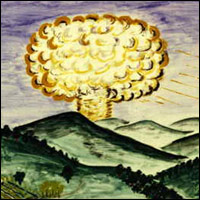 The Bush administration's compulsive urge to possess the power to detain without oversight and to wield torture as a tool of interrogation has led it, however unexpectedly, into what can only be called a confessional stance. It was via Guantanamo that they meant to announce the arrival of this power on planet Earth. They were proud of it. And that prison complex was to function as their bragging rights. Their message was clear enough: In this world of ours, democracy would indeed run rampant and a vote of one would, in every case, be considered a majority.
The Bush administration's compulsive urge to possess the power to detain without oversight and to wield torture as a tool of interrogation has led it, however unexpectedly, into what can only be called a confessional stance. It was via Guantanamo that they meant to announce the arrival of this power on planet Earth. They were proud of it. And that prison complex was to function as their bragging rights. Their message was clear enough: In this world of ours, democracy would indeed run rampant and a vote of one would, in every case, be considered a majority.
The urge to take pride in their "accomplishments," to assert their powers, and to claim to redefine what was legal could also be seen as the urge to confess (if matters took a wrong turn as, in the case of the Bush administration, they always have). And so, along with the pride, along with the kidnappings, the new-style imprisonment, the acts of torture (and, in some cases, murder), the pretzled documents began to pour out of the administration -- each a tortured extremity of bizarre legalisms (as with John Yoo's infamous "torture memo" of August 2002, which essentially managed to reposition torture as something that existed mainly in the mind of, and could only be defined by, the torturer himself).
Of course, plumbing the psychology of a single individual while in office -- of a President or a Vice President -- is a nearly impossible task. Plumbing the psychology of an administration? Who can do it? And yet, sometimes officials may essentially do it for you. Sometimes, it's just a matter of refocusing to see the documents, the statements, the acts for what they are. Such is the case with the torture memos that continue to emerge. Never has an administration -- and hardly has a torturing regime anywhere -- had so many of its secret documents aired while it was still in the act. Seldom has a ruling group made such an open case for its own crimes. They can't help themselves. They want to confess
|







